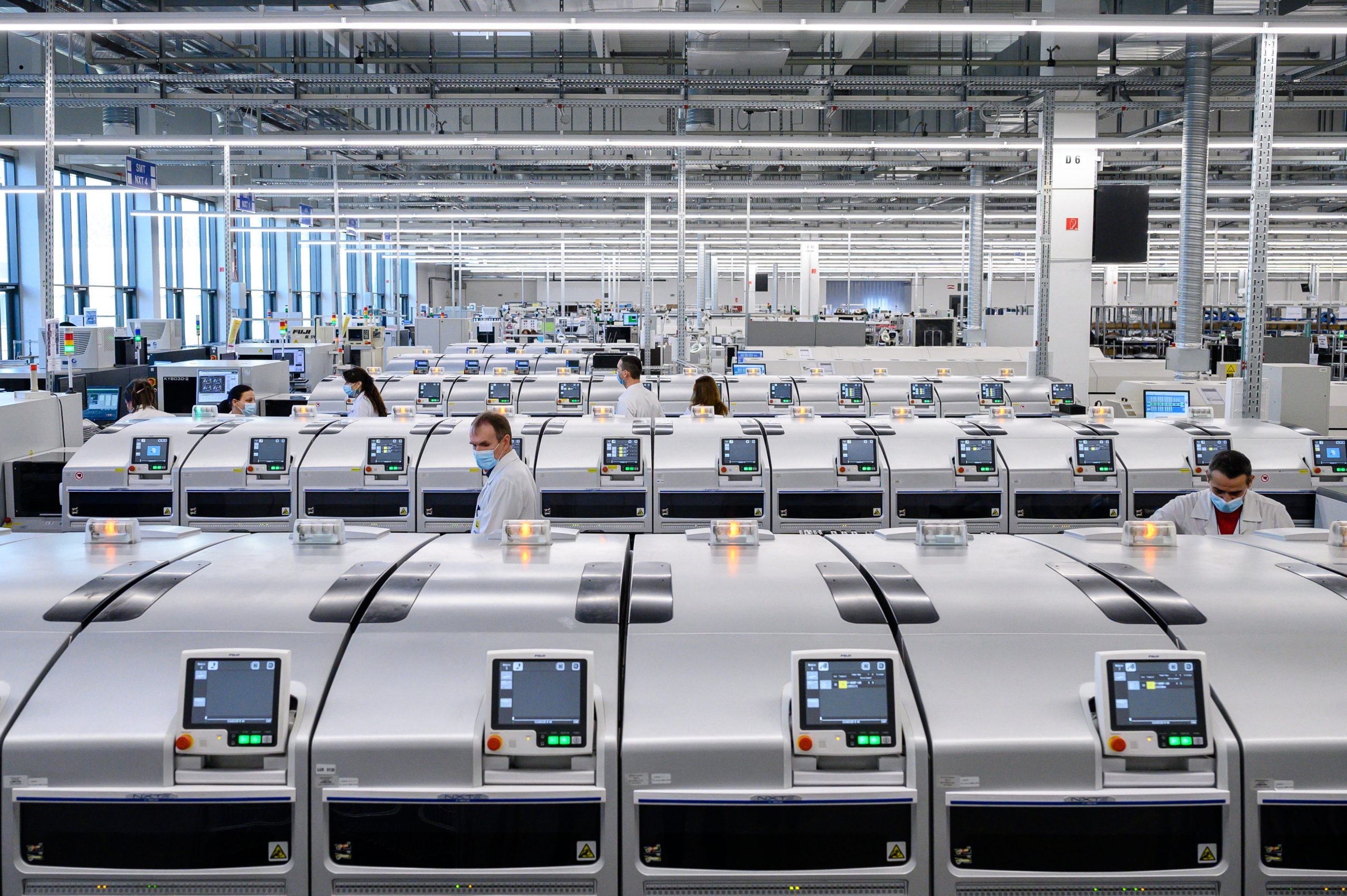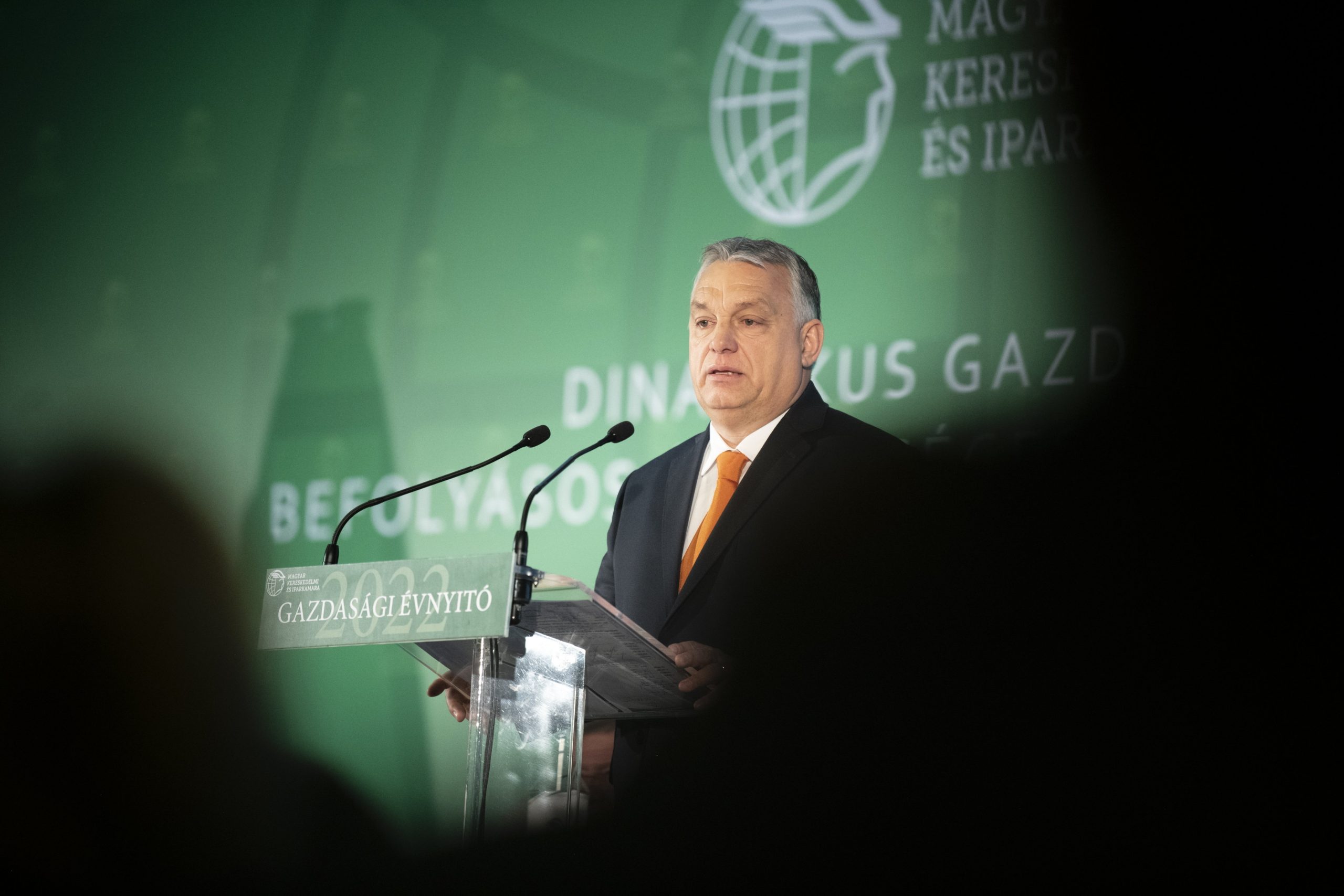
The Hungarian economic output grew by an annual 7.2 percent in the fourth quarter, bringing full-year growth to 7.1 percent.Continue reading

The April 3 general election will decide whether or not “Hungary retains its new economy or we go back to the old one”, Prime Minister Viktor Orbán told a conference of the Hungarian Chamber of Commerce and Industry on Saturday.
Orbán said the government had completely overhauled the economy after 2010. “Our economy today is not the same” as the old one, he added.
The opposition, he said, “rejects the link between work and benefits; yet one of the greatest innovations has been to link all the money we made available to people from the economy to work.”
“We completely oppose any communist, socialist approach to economic policymaking,” he added.
Orbán stressed the importance of private property as the basis for prosperity and on which the nation could build its future. The Fidesz government “wants people to have their own homes, savings, and their own land,” he added.
He said when people owned their assets they managed them, thereby creating a different kind of culture and behavior. “You cannot just live from hand to mouth.”
Orbán pledged that after the election “we will firmly support private property out of a philosophical conviction”.
He also vowed to sign a strategic agreement with the commerce and industry chamber. “The government needs allies to ensure a social background for its policies aimed at building a stronger Hungary,” he said.
Concerning the economy, Orbán noted that a similar economic expansion to last year’s 7.1 percent had last been seen in 1977, while the rate of foreign investments in Hungary in 2021 was the second highest in the EU.
The pandemic has been a major stress test for the new economic model, Orbán said. The government’s crisis management helped the country pass that test with a “fast and strong recovery”, he said, adding it helped that the crisis had hit the country when the economy was strong enough to withstand the headwinds. With its high diversity, Hungary’s economy is the 10th most competitive country in the world, he said.
Meanwhile, he said Hungary was a “transit country” but this advantage hadn’t been sufficiently exploited over the past 20-30 years, and more economic benefits could be tapped from its geographical location. The more goods that transit the country the better, he said.
Orbán said Hungary’s motorway kilometers per capita were the highest in the Visegrad Group but railway and air traffic capacities should be further developed.
“Critics of such projects as the Belgrade-Budapest rail upgrade wish the worst,” he said, adding that such critics “would see somebody else exploit the opportunity”.
Concerning Hungary’s foreign debt, the prime minister said it “cannot go above 80 percent even in times of crisis” or else “nobody will save us from fiscal alcoholism”. Noting that the debt ratio had been over 80 percent in 2010, he said it was a “moral obligation” not to cross that line unless absolutely necessary.
Orbán praised his government’s crisis management strategy for not compromising the budget and keeping the labor market stable. He noted that the number of the employed, 4.7 million people, had not been as high since 1990.
Orbán said if Hungary’s inflation rate fell from the current level of over 7 percent to 6 percent by year-end, the inflation environment would still be high in the coming years, and part of the reason why, he added, was that Brussels was failing to coordinate climate policy with economic policy, leading to high energy prices.
Also, the Russia-Ukraine standoff and the fate of the North Stream gas pipeline had a part of play, he said. With high energy prices, Russia can bump up its profits by selling less gas, he added. The big question over the next few months was what the outcome would be and how this would affect inflation, he said.
“Time is not on our side, it is on their side,” the prime minister said. He noted that Hungary, however, has signed long-term gas supply agreements with Russia, with increasing volumes expected.
Regarding caps on fuel, interest on loan repayments, and food prices, Orbán insisted it had been necessary to intervene to combat inflation. “Let me reassure everyone: we haven’t taken leave of our senses, and we don’t have any intention of restoring” price controls.”
The prime minister noted five areas that may hold the Hungarian economy back in the future unless the government made timely decisions: the overly high level of foreign ownership in the economy, the dominant role of large exporting companies, the relative dearth of quality small and medium-sized enterprises among exporters, profit-poor domestic companies, the fact that foreign companies are more productive than their domestic peers, and the country beyond Budapest lagging behind it.
Between 2010 and 2020, Hungarian ownership in the energy sector, the banking sector and the media increased greatly, but the insurance sector, telecommunications industry, building materials and food retail are still largely in foreign hands, he said.
At the same time, without foreign capital “we aren’t competitive, there’s no full employment or new technologies,” he said, adding that it wouldn’t be desirable to pursue a policy with a bias against foreign investment. “At the same time, Hungarian ownership must be strengthened,” he said.
Now Hungary has 12,000 export-oriented companies as opposed to 2,000 in 2010, Orbán said. Yet foreign-owned companies generate 80 percent of export revenue. The aim, he added, is to boost domestic exporters to 30 percent. Markets that produce higher profits than the West, such as the Balkans and China, must be targeted in this regard, he said.
Orbán said that whereas many domestic companies were expanding, “we aren’t doing well in regional comparison”. “We must mobilize our tools, knowledge and skills” to increase the number of Hungarian companies making a profit, he said.
The prime minister said the productivity of foreign companies in Hungary was much higher than their Hungarian peers, though the rate of increase in domestic productivity was at least outpacing that of foreign ones.
He said Hungarian companies must do more to digitalize and automate. The government, he added, stood ready to help. Also, R and D spending must increase, he added.
The prime minister said the government intended to spend three times as much on rural development in the next two years, and this included developing cities. He noted that in 2021, 190 billion forints was spent on village development, and an additional 93 billion is being spent this year.
To address these issues, the state must continue to provide support, Orbán said. “Public funds are needed for financing, and we need tax cuts, investment support and loan guarantees.”
The plan to relaunch the economy in the 2021 budget, he noted, provided 12 percent of GDP to these kinds of developments while this proportion has been raised to 5 percent this year.
Concerning EU funding, the prime minister said Hungary’s balance of profits was negative and 77 percent of this was offset by EU money, so it was right to “speak with sufficient self-awareness” while being upfront with foreign investors and European bureaucrats “rather than speaking softly, because they owe us and we don’t owe them.”
Regarding the EU recovery fund, Orbán insisted child protection law was the reason why Hungary’s EU money had been withheld, adding that the EU’s position was “groundless morally and legally”, though Hungary, he added, was “winning rather than losing the battle”.
Although the recent European court ruling “stipulates that community funds can be tied to political considerations”, the ruling’s justification also suggests that “there must be no connection in general between the rule of law and funding,” Orbán said. “We can only speak of actual cases; they can’t say ‘Hungary has no press freedom so we’re not giving them any money’.” “We may be right but we have no money,” he said, noting however that the government was pre-financing projects until “the funds arrive before the end of the year, either partially or in full”.
Concerning tax cuts, Orbán said Hungary had the 13th most competitive tax system globally, with the corporate tax the sixth lowest in the world and personal income tax the 9th lowest. “This is what the Hungarian economy hinges on,” he said. Every effort must be made to “protect that tax system, because if it is taken apart, the competitiveness of the Hungarian economy will plummet.”
Orbán said that historically tax centralization, at 35 percent of GDP, had never been so low, and the tax wedge had fallen from 53.1 percent to 41.2 percent in recent years.
On the subject of wages, the prime minister said: “They may be raised as high as employers and employees agree without increasing unemployment”, and he pledged the government’s continued assistance in this area.
Orbán said education and businesses should be more closely aligned, and it was not good if theory and practice inhabited separate orbits. The overhaul of the university model is costing the central budget 2,700 billion forints, but the funds, he said, “will go towards economic development too”.
“Hungarian universities should match western Europe’s competitive universities,” he said.
Meanwhile, Orbán said the government had “fulfilled every point” of an earlier agreement with the chamber, contributing to the high employment rate. The government will similarly honour another agreement, helping the country keep its GDP growth 2-3 percent above the EU average, he said.
“If in the next ten years we can implement this agreement, by 2030 we could become as developed as the EU average. We will have defence capabilities, good universities, and a technological advantage compared with others in the region — all combined with good political leadership — so that the country will have a higher overall level of competitiveness within the region and beyond,” the prime minister said.
Featured photo by Benko Vivien Cher/PM’s press office/MTI